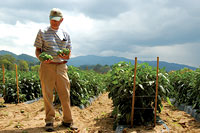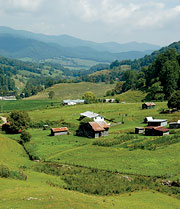
Bill Holbrook of Haywood County’s Bethel community checks his crop of bell peppers. Photos by Kent Priestley
|
The Sandy Mush community, 20 miles northwest of Asheville, is the sort of place that would make a real-estate broker’s hands sweat and twitch. A broad, creek-lined valley floor nudges up against the Newfound Mountains, whose cloak of forest is broken by pastures so steep and green that it’s easy to imagine Julie Andrews whirling around up there, lost in song.
It’s also easy, given the pace of growth in Western North Carolina, to imagine subdivisions along these same peaks, places with steel gates and blue-blooded names like “The Holdings,” “The Reserves at Sandy Mush” and “Pure Aire.”
Bill Duckett‘s family has farmed Sandy Mush for five generations. Their holdings include 550 acres of grazing land, forestland and fields of corn and tobacco. Most years, Duckett runs 120 head of cattle on his pastures. Now, at 71, he’s worried he may be at the waning end of a long tradition.
“It’s changing here,” says Duckett, taking a break from mowing one of his fields on a hot morning. “I can show you what used to be a farm over there, on the upper end.” He points to a nearby hillside. “Now it’s about half a dozen different tracts, some with bigger houses, some with mobile homes. It’ll never be a farm again. It’s gone.”

Prime farmland or prime real estate?: The view into the Sandy Mush community.
|
The changes Duckett speaks of are mostly small and incremental — parents selling off portions of their farm here or there, often to younger family members wanting to build houses of their own. But cumulatively, even these minor changes are altering the complexion of rural areas and driving up the price of land. And bigger changes are on the horizon. A subdivision named Whisper Mountain, of 70 homes on 259 acres, is planned for the valley.
Many farmers in Western North Carolina share Duckett’s apprehension. At a recent meeting on farmland preservation held near Fletcher, a speaker asked the group of farmers gathered how many of them had been asked to sell their land during the past few months. Nearly everyone in the crowded room raised a hand.
Earlier this year, after mulling it over with his family, Duckett decided to put a portion of the farm — 54 acres — into a conservation easement. The Asheville-based nonprofit Southern Appalachian Highlands Conservancy helped facilitate the deal.
Agriculture conservation easements are voluntary, legally binding agreements that limit development on properties in order to preserve their use as agricultural land. A third party, such as the state, the county or nonprofit conservancies such as land trusts, holds the development rights and is usually responsible for ensuring compliance with the easement’s terms. The agreement is perpetual, passing on to whomever buys the land.
“There are financial benefits with a conservation easement, mainly federal income tax deductions and N.C. income tax credits,” says William Hamilton, farmland specialist with the Southern Appalachian Highlands Conservancy. “Another advantage is the fact that conservation easements reduce estate tax on property.”
For farmers who are reluctant to forfeit development rights on their properties, there are other ways of protecting land. Many counties have voluntary agricultural districts, which landowners can choose to join. Being a part of a district confers certain advantages, including protection from nuisance suits from neighbors who might not share a love of the rural arts. In Buncombe County, which has more than 26,000 acres in farming districts, a 10-year commitment is required to participate in the program.
And farmers can get a measure of tax relief by applying for something called “present-use value.” Landowners with at least one 10-acre parcel of land, the gross revenues of which average a minimum $1,000 over three years, are taxed on their agricultural use of the land rather than its market value. In Buncombe County, savings average 25 percent, according to the county tax office.
Losing a tradition
The image of farmers as land-rich but cash-poor is as old as the profession itself. A farmer’s capital is tied up in the land he or she works, and, given the financial demands of modern life and the advancing age of the farming population (the typical farmer in North Carolina is nearly 60 years old, according to the U.S. Census of Agriculture), the temptation to sell has never been greater.
“Their land is their 401K plan. This is their retirement,” explains Bill Yarborough, regional agronomist with the N.C. Department of Agriculture. Major medical expenses, unforeseen needs and nursing-home care are some of the reasons farmers might choose to liquidate some — or all — of their assets.
Rising taxes are another challenge. Duckett, for example, saw most of his acreage double in value with Buncombe County’s last revaluation. Some of his land nearly tripled in value.
Loss of farmland is a national problem, and North Carolina ranks high — fourth, in fact — among the 50 states. Last year the state led the U.S. in loss of individual farms. According to Yarborough, the state’s western counties have lost 80 percent of their prime farmland since the 1960s.
Along with increased development pressure, farmers face succession problems. Often, sons and daughters don’t have the inclination or aptitude to take up where their parents leave off, and at present, says Holbrook, there’s no tried-and-true way to link working farmers with young farmers looking for land.
“That’s the only option in Western North Carolina: People think they’ve got to sell their land to developers. Those are the only people who show up,” says Yarborough. “Here you’ve got these farms with great soils and a proven record, but there’s no way to connect people who want to sell with people who want to farm.”
Beyond the tired platitudes (“No farms, no food”), farmland preservation groups say there is ample reason to save farmland. Private agriculture land generates considerable tax revenues but asks for little in local services. Farms and forests help control flooding and offset air pollution from industry and residential development. They provide relief from sprawl. Then there are the intangibles: scenic value, historic value, cultural value.
Yarborough also believes cultivated land serves another, less obvious purpose. “Where do we put schools, where do we put roads? Where does industry go? Where are people buried? Farmland is a natural resource like anything else. A time is going to come when we don’t have any land to build anything on.”
Same problem, different place
Bill Holbrook farms in the Bethel community, south of Canton, a long, fertile valley split by the swift waters of the Pigeon River. He raises tobacco, pumpkins, bell peppers and fresh-market tomatoes. The last — 20 acres of them — roll green and ordered away from his house. Across the river, his pepper field has heartbreaking views to Cold Mountain.
Holbrook has farmed all his life, but it was only 13 years ago, after retiring from a 25-year career at Canton’s Dayco factory, that he began farming fulltime. Holbrook has an entrepreneurial streak and his farm has a well-ordered appearance to match, but no amount of planning can control what happens to his surroundings.
“My mother was raised right there on a farm,” Holbrook says, gesturing across the road. “It’s still a hundred acres. But her sister’s grandkids own it now, and it’s just a matter of time before it’s sold. And that’s the end of it.”
The Southern Appalachian Highlands Conservancy began courting Holbrook and his wife six months ago, hoping to get at least a portion of his land into a conservation easement. But making it happen will not be cheap. Surveys, legal fees and transfer costs can run into the tens of thousands of dollars.
“The will is there on Bill’s part, but right now there’s just no way for us to bargain with him,” says Hamilton. “We don’t have any money to bring to the table. So this is a good example of why we need money in the North Carolina Farmland Preservation Trust Fund.”
The fund Hamilton speaks of was established in August 2005 by the General Assembly. The stated objectives are to make funds available for conservation easements and other preservation efforts. But despite Agriculture Commissioner Steve Troxler‘s apparent commitment to farmland preservation, the fund remains more or less an unfunded mandate; this year, just $45,000 were added to it, for a “pilot project” to familiarize officials with the issue.
For a model, state leaders might look north to Maryland, whose Agricultural Land Preservation Foundation, over a 30-year period, has protected 250,000 acres on approximately 2,000 farms. The state-managed foundation oversees more than $333 million in public investments and encourages fund-raising at the county level to trigger matching state funds. Pennsylvania and Vermont have similar commitments to farmland preservation.
In the absence of state funds for farmland preservation, local funds are serving as a patch. For example, in its fiscal year 2007 budget, the Buncombe County Board of Commissioners earmarked $1 million for farmland preservation at the urging of both the Buncombe County Land Conservation Advisory Board and the Buncombe County Farmland Preservation Board.
“I think for a lot of these farm families, it’s almost abhorrent to think of their land being surrounded by new houses and suburban people,” states John Ager, chairman of the Buncombe County Farmland Preservation Board and a Fairview farm-owner. “They’ve looked for calves on every corner of their land, they’ve put crops in and harvested them, they’ve cut timber off it, they’ve worried some, they’ve worked hard. You get so attached to a place. You might call that romantic, but it’s a real feeling. And if there’s a way that their land, and their relationship to it, can be preserved, I think a lot of people are willing to give it a try.”
Without protection in place, Bill Yarborough knows too well what can happen to even the most valuable, productive farmland. “If you go over to Mills River [in Henderson County], that place is gone. They’re building where we always thought you couldn’t build, on the floodplain. But shoot, they’re building just as fast as they can put houses up. And those are our best soils. Some of the best soils in the world are located in these mountain valleys.
“I don’t know how we’re going to stop it unless we make a concerted effort in all groups. We’re not just talking about people who like wetlands, or people who care about riparian areas, or people who want farmland. It’s going to take all of us coming together to say that we appreciate what farmers are doing and that we want it to be able to continue.”
Farmland preservation toolbox
A number of local and regional agencies can help landowners with conserving agricultural land:
Conservancies:
American Farmland Trust
Southeast Regional Office
Graham, N.C.
Contact: Gerry Cohn, (336) 221-0707, gcohn@farmland.org
Carolina Mountain Land Conservancy
Hendersonville
Contact: John Bonham, 697-5777, john@carolinamountain.org
Southern Appalachian Highlands Conservancy
Asheville
Contact: William Hamilton, 253-0095, william@appalachian.org
Present-use tax information:
Buncombe County Tax Office
Asheville
Contact: Alice Coppedge, 250-4950, alice.coppedge@buncombecounty.org
Local farmland preservation efforts:
Buncombe County Farmland Preservation Board
Asheville
Contact: John Ager, 628-2616, jager@ioa.com
Haywood County Soil and Water Conservation District
Waynesville
Contact: Leslie Smathers, 452-2741
Madison County Soil and Water Conservation District
Marshall
Contact: 649-3313


Before you comment
The comments section is here to provide a platform for civil dialogue on the issues we face together as a local community. Xpress is committed to offering this platform for all voices, but when the tone of the discussion gets nasty or strays off topic, we believe many people choose not to participate. Xpress editors are determined to moderate comments to ensure a constructive interchange is maintained. All comments judged not to be in keeping with the spirit of civil discourse will be removed and repeat violators will be banned. See here for our terms of service. Thank you for being part of this effort to promote respectful discussion.